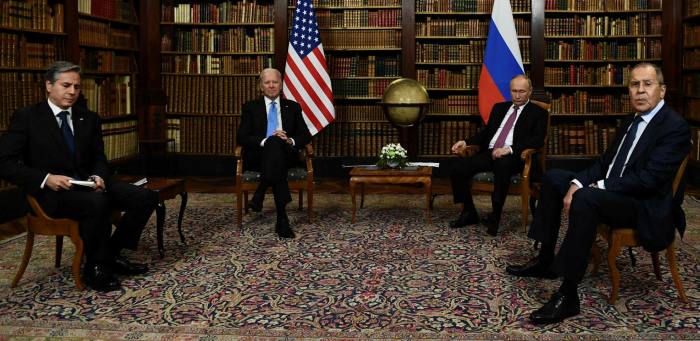Joe Biden warned Vladimir Putin that there would be “devastating” consequences for Russia if opposition activist Alexei Navalny were to die in prison after “open” and “frank” talks aimed at stabilising relations between the two countries.
In their first face-to-face meeting as leaders, the presidents agreed to begin bilateral talks on preventing cyber attacks, restart talks on arms control, restore their ambassadors to their respective embassies and explore a potential exchange of citizens held in each other’s prisons, Putin said.
Billed as a meeting riddled with difficult topics and mutual grievances, Putin told reporters following talks that lasted three and a half hours that there was “no hostility” and the conversation was “efficient . . . and constructive”.
“This was a productive meeting,” Putin said. “It was fruitful. It was to the point, and it took place in an atmosphere that was enabling . . . it gave us glimpses of confidence and hope.”
Putin praised Biden’s moral qualities and described his approach as pragmatic and well balanced, but said it was “hard to say” whether relations would improve as a result.
Biden told reporters that he had warned Putin that “certain critical infrastructure should be off limits” regarding cyber attacks.
“I said: ‘How would you feel if ransomware took down the pipelines that run from your oilfields?’” Biden said.
But he echoed Putin’s comments about the tone of the meeting, which he said was “good, positive . . . There wasn’t any strident action taken.”
He added that he raised the issue of Navalny’s detention with Putin and what would happen if the activist died in prison. “I made it clear to him the consequences of that would be devastating for Russia.”
Navalny was arrested and sentenced to prison recently after returning to Russia. “Human rights is always going to be on the table,” Biden said.
Putin had answered questions about Navalny by saying that he had broken Russian law and knew he would be jailed if he returned to Russia, and claimed that his political activity was seeking to weaken Russia.
The meeting started at about 1.30pm local time with a handshake between the two leaders at the 18th-century Villa La Grange by Lake Geneva, and ended just after 5pm, more than an hour earlier than aides had predicted.

Cyber warfare was one of the biggest irritants before the summit, following a major hack of US government agencies last year by Russia-based groups, and alleged disinformation campaigns in the US by Moscow-backed organisations.
Biden had described Putin as a “worthy adversary” ahead of the meeting and said he was going to clarify to the Russian leader “what the red lines are”. Russia was seeking to drive a wedge in transatlantic solidarity and the US was experiencing an increase in malicious cyber activity, Biden added. He promised to respond in kind if necessary.
“We believe cyber space is extraordinarily important in general and in particular for the US, and to the same extent for Russia,” Putin told reporters.
The agreed bilateral government talks on cyber security will be a first for the US and Russia, and have previously been resisted by Washington.
Biden and Putin also grappled with a long list of accusations, complaints and charges against one another, including alleged Russian meddling in US elections, US sanctions against Moscow and the Kremlin’s misgivings over Nato military expansion in eastern Europe.
Other difficulties in the relationship are torn-up arms control agreements and war in Ukraine.
Biden travelled to the Swiss city after a week in Europe meeting G7, EU and Nato allies. The response to threats posed by Russia was continually raised in talks with western leaders. The EU warned in a foreign policy paper on Wednesday of a “negative spiral” in EU-Russia relations.
The US president said world leaders had thanked him for holding the summit, which some analysts have criticised as handing Putin a diplomatic victory.
Biden said at the outset of the meeting: “As I said outside, it is always better to meet face-to-face to try to determine where we have mutual interest; co-operate, and where we don’t, establish predictable and rational” relations. He added: “Two great powers.”
Putin said that his ambassador would return to Washington, and the US ambassador would return to Moscow following the talks.
The respective diplomats left their posts earlier in the year after a chain of events prompted by Biden agreeing with an interviewer that Putin was a “killer”.

